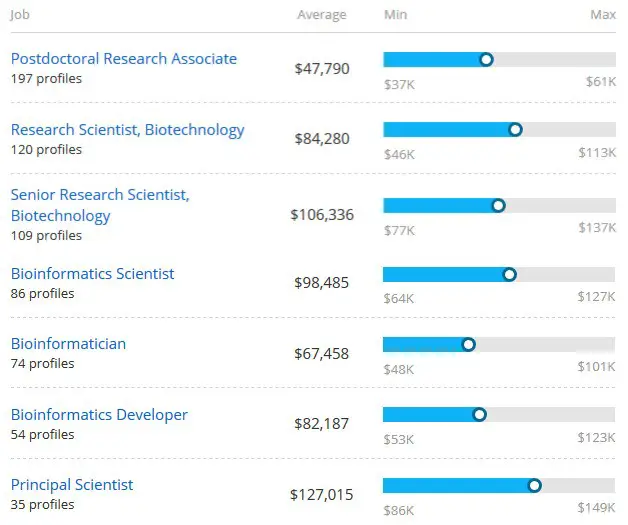How to become a Bioinformatics Researcher
This article provides in-depth information into What is Bioinformatics Researcher? What Bioinformatics Researchers do? Degrees for Bioinformatics Researchers, Steps to become Bioinformatics Researcher and much more.
A bioinformatics researcher’s point is to better comprehend life through an application of a mix of computer science, statistics, life sciences, molecular biology, genetics, chemistry, etc. A bioinformatics analyst tries to display, find, and oversee biological data normally through computational means.
Steps to become a successful bioinformatics researcher:
- Earn a bachelor's degree in Bioinformatics, Computer science or other related fields
- Gain experience through internships
- Specialize through a Master's degree
- Get trained at Research laboratories
- Consider Ph.D.
Further details about the career outlook of this profession are,
|
Career Title |
Bioinformatics Researcher |
|
Degree Requirements |
Master’s degree (Bioinformatics, Computer science or other related fields) |
|
Job Growth |
6% |
|
Experience required |
1 year in a Research position and Postdoctoral appointments |
|
Salary (2020) |
$95,682 |
|
How long to become a Bioinformatics Researcher |
6 years |
|
Required Skills |
Problem-solving, communication, analytical thinking, mathematics skills |
What does a Bioinformatics Researcher do ?
Bioinformatics Scientists use computers to store, retrieve, and analyze genetic information. Their work helps pharmaceutical and biotechnology companies develop gene therapies to prevent, treat, and cure illnesses like cancer, Alzheimer’s disease, Parkinson’s disease, arthritis, and even asthma.
-
Study and examine sub-atomic level information.
-
Manipulate database containing genomic and post-genomic data.
-
Design and update informatics tools.
-
Analytically and computationally solve biological problems in order to meet research goals.
-
Work with other biologists and software engineers to develop biological databases.
-
Design bioinformatics endeavors that will enhance well-being or pharmaceutical enterprises.
Steps for becoming a Bioinformatics Researcher
1
Procure A Bachelor’s Degree
A few bioinformatics or related interdisciplinary programs are available for undergraduates such as computational biology or biomathematics. Applying to a graduate program in bioinformatics does not require majoring in bioinformatics or a related field. Applicants may have bachelor's degrees in life and physical sciences, computer science, statistics, and math.

2
Get An Internship
Internships are normally required in the senior year of undergraduate study. Doing a summer internship in the related field will give students a chance to gain real-world experience. It will also increase your chances to get into a good college for masters.

3
Pursue Master’s Degree
A graduate degree in bioinformatics is not necessary to get an entry-level job but a graduate degree opens up more opportunity for advancement. It is not necessary to get your bachelor’s degree in bioinformatics to qualify to pursue a master's in bioinformatics. However, students need to complete prerequisites in subjects that typically include molecular biology, genetics, chemistry, statistics, linear algebra and computer programming.

4
Get Training
Students have an opportunity to get hands-on training during their bachelor’s and master’s programs. Several universities offer summer institutes to provide undergraduate students with bioinformatics research experiences. Bioinformatics students may also gain research experience through on-campus research laboratories in genome science or bioinformatics research centers, as well as seek options in companies.

5
Get A Ph.D.
Doctoral projects commonly offer educating and shared research with associations, for example, the National Cancer Institute, the National Institutes of Health and the National Science Foundation.

Bioinformatics Researcher Degree Levels
Bachelors
A bachelor’s degree in bioinformatics covers both theoretical and practical aspects of biology and computing. It gives students a solid foundation in biology, computer science, mathematics, chemistry, and statistics so that students have the necessary skills to use computing tools to address contemporary problems in biology and medicine.
Molecular Biology
-
DNA Replication
-
Gene structure and transcription
-
RNA Processing
Objectives
-
Understand biological activity at the molecular level
-
Conduct scientific research
-
Implement the scientific method to explain biological phenomena
Programming for Bioinformatics
-
R
-
Python
-
perl
Objectives
-
Coding in the genetic level
-
Solve biological problems
-
Apply computational algorithms
Linear Algebra
-
Matrix operations, including inverses
-
Matrix operations, including inverses
-
Linear models and least-squares
Objectives
-
Study of linear sets of equations
-
Transformation properties
-
Solve systems of linear equations
Masters
Master's programs in bioinformatics can lead to careers working in biotechnology, bioinformatics companies or labs. In master’s program students develop skills in programming, statistical modeling, and other areas of computer science to analyze and interpret complex biological data.
Molecular modeling
-
Molecular Dynamics
-
Monte Carlo Methods
-
First Principles Methods
Objectives
-
Theoretical and computational models
-
Mimic the behavior of molecules
-
Evaluating molecular models
Biochemistry
-
Amino Acids and Protein Structure
-
Enzymes
-
Protein Function
Objectives
- Chemical process in the living organism
-
Identify polymeric biomolecules
-
Specificity of enzymes
Molecular cell biology
-
Organelles and membrane systems
-
Sterilisation techniques
-
cultivation of eukaryotic cells
Objectives
-
Fundamental discoveries in gene expression
-
Genome organization, cellular morphology
-
Function molecular metabolism
Doctorate
A Ph.D. in bioinformatics, genetics or genomics is generally required to engage in advanced research. Ph.D. programs in bioinformatics emphasize research and lab rotations that are responsive to the evolving nature of bioinformatics and computational biology.
Computational neuroscience
-
Linear algebra
-
Neuroanatomy
-
Hodgkin Huxley model
Objectives
-
Use of mathematical tools and theories
-
Investigate brain function
-
Computation of biological neurons
Macromolecular structure
-
DNA recognition
-
Transcription Factor Binding
-
Catalysis
Objectives
-
Levels of protein structure
-
Enzyme mechanisms
-
Membrane chemistry & architecture
Probabilistic modeling
-
Bayesian statistics
-
Regression
-
Ensemble learning
Objectives
-
Incorporate random variables
-
Probability distribution
-
Cognitive modeling
Bioinformatics researcher’s salary
According to the Bureau of Labour Statistics 2020, the average salary offered to the bioinformatics researcher in the United States is about $122,014 annually and it typically ranges from $99,044 to $133,844. The salary offered to the candidates usually depends on the education, certification, additional skills, amount of experience in that field.
Job growth
The employment opportunity for bioinformatics research is projected to increase by up to 16 percent according to the Bureau of Labour Statistics over the period of 2018 to 2028. The growth is estimated to be faster than the average growth of jobs. The rapid growth of this profession is due to the emerging scientific discipline and research on genetic diseases and the approach to personalized medicine development.
Job concentrations for Bioinformatics Researcher
After completing the degree, you explore how to land on the job. Hence you could use your degree and certification to get other job opportunities such as,
Laboratory researcher:
Many scientific laboratories open job opportunities to lab researchers for academic as well as commercial purposes. When you complete education to become bioinformatics, you can support the research conducted in labs in specific areas of research. You display your technologies in testing the samples, interpreting the data, and innovating new ideas.
Core facilities:
In many institutions, the laboratory is the core domain to add value and the researchers act at the center of resources provided for the institution. Hence those resource providers are core facilitators. As a bioinformatics researcher, the lab progresses with innovations to new methodologies and skills adopted on different projects.
Educators:
We now know that bioinformatics is an emerging field, and bioinformatics researchers can work as professors and teachers at colleges and universities to train students in this field. You may require a Ph.D. in bioinformatics to land on this as a professor. There are a number of institutions that provide opportunities to teach bioinformatics within the institution.
Software developers:
Bioinformatic researchers can also choose to become software developers with the extensive computer knowledge and programming languages they learned during their coursework. With the development of new algorithms and building the computational tools you can support bioinformatics.
Stand out skills for a bioinformatics researcher
Bioinformatics researchers have high academic knowledge, but there are certain skills to stand out from the crowd. They are,
Computer knowledge: you must be well aware of the use of technology to conduct effective research. With good knowledge of programming languages such as R, Perl, Java, Python, Matlab, machine learning tools are useful for computations and other analyses.
Biology Knowledge: Biology is a vast subject to study, however, you could specialize in the field of your choice like molecular biology, genetics, cancer biology, or modern biology which vary depending on the researcher you want to be.
Managerial skills: This comes under the interpersonal skills which you develop over time. Being an individual contributor or a researcher at a lab in certain projects, you must be well versed in handling the projects well.
Communication: Communication is an important skill that helps in researching well and explaining your work. Effective communication helps in presenting the clarity of thoughts and ideas you have in your work.
Multitasking: In some situations, you might face challenges that might require extra effort. Hence multitasking and completing the work assigned before the deadline helps in advancing in your work profile.
